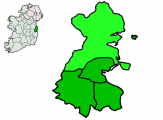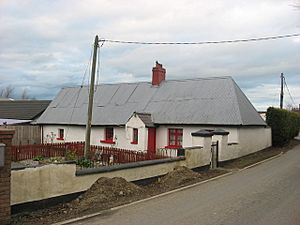Fingallian facts for kids
Quick facts for kids Fingallian |
|
|---|---|
| Fingallian | |
| Native to | Ireland |
| Region | Fingal |
| Extinct | Mid-19th century |
| Language family |
Indo-European
|
| Early forms: |
Proto-Indo-European
|
Fingallian or the Fingal dialect is an extinct variety of English formerly spoken in Fingal, Ireland. It is thought to have been an offshoot of Middle English, which was brought to Ireland during the Norman invasion, and was extinct by the mid-19th century. Although little is known of Fingallian, it is thought to have been similar to the Forth and Bargy dialect of County Wexford.
The surviving literature of Fingallian consists of two satirical or humorous poems, the short "Fingallian Dance" and the much longer Purgatorium Hibernicum. Both poems are anonymous and are thought to be humorous parodies of Fingallian by non-native speakers, so their value from a linguistic point of view may be limited.
Contents
History
Fingallian was spoken in the region of Fingal, traditionally the part of County Dublin north of the River Tolka. It was spoken in the area near the northern border. The name "Fingal" is from the Irish Fine Gall, or "territory of foreigners", probably a reference to a Norse settlement in the area. Linguist Alf Sommerfelt proposed the idea of a Norse influence on the Fingallian dialect, though later scholars have found no evidence of such a connection.
Like the Yola dialect of Forth and Bargy in County Wexford, Fingallian is thought to have derived from Middle English, which was introduced by "Old English" settlers after the Norman invasion of Ireland in 1169. Middle English was well established in southeastern Ireland until the 14th century, when the area was re-Gaelicized and English was displaced. As such, the Yola and Fingal dialects would have been the only attested relicts of this original English variety in Ireland.
The Fingallian Dance
The poem most likely to have been composed by a native speaker of Fingallian is The Fingallian Dance, a brief, three-stanza poem written between about 1650 and 1660. It is a poem about a man going to see dancers at a bullring (bull fighting was practised in 17th century Ireland). Although the poem is likely to have been standardised when written down, it gives a flavour of Fingallian, particularly forms like fat for "what" or fen for "when".
Purgatorium Hibernicum
The Purgatorium Hibernicum is a humorous burlesque or travesty on the Roman poet Virgil's Aeneid. It exists in three versions: the original manuscript (Purgatoriam Hibernicum), another manuscript entitled The Fingallian Travesty: the Sixt Book of Virgill's Aenoeids a la mode de Fingaule (1670–5), and a printed version called The Irish Hudibras or The Fingallian Burlesque (1689).
Letters from Ireland
In John Dunton's Letters from Ireland (1698) he writes that in Fingal "they have a sort of jargon speech peculiar to themselves, and understand not one word of Irish, and are as little understood by the English". Dunton gives a sample of the language; a lamentation that a mother made over the grave of her son, who was a keen fisher and hunter.
Modern Fingal English
Although Fingallian is no longer spoken, a large number of dialect words unique to Fingal have survived, especially in traditional Fingal towns and villages such as Swords (now a large suburb of Dublin), Skerries, Rush, Lusk, Donabate, Garristown, Oldtown, Balrothery, Portrane and Naul. Major sources for these include glossaries in an article in the folklore Journal Béaloideas by J. J. Hogan and Patrick O'Neill and a book on Fingal lore entitled Fair Fingall by Patrick Archer.
Examples from Archer's Glossary include:
- Cinnit (pronounced with hard 'C') – a dodger, trickster
- Cloustered – covered up in clothes
- Dalk – a thorn, Ir. dealg
- Dawney – delicate, weak
- Lawneyday – an exclamation of surprise or regret, Ir. Láine Dé
- Mullacking – working or walking in mud
- Possing – sopping wet
- Rossie – robust, blustering female
- Scut – a short, mean person, a wren
Examples from Hogan and O'Neill's Glossary include:
- Barney – a quarrel, a row
- Bunched – ruined, finished
- Buthoon – a bad blunder, Ir. Botún
- Clift – a normally sensible person who has done something stupid
- Cobby – cunning, worldly wise
- Dugging – prodding or punching a person, fighting
- Foopah – a blunder, Fr. faux pas
- Gollockers – eyes (contempuously)
- Go-boy – a sly fellow who goes about doing harm in secret
- Launa-wallya – something to think about 'a bellyful', Ir. Lán a' mhála (meaning 'bagful')
- Malavogue – to beat or maul
- Moggy – a fat lazy person
- Randyvoo – a house where people meet for a chat or mischief, Fr. rendez-vous
- Raucie – a girl given to gadding about
- Simmy-saumy – a foolish-looking person
- Squib – a word used to address a stranger, esp. a boy e.g. 'hey, squib'
- Tamboo – a shebeen, a miserable looking house
- Whack – nothing, nobody, Ir. faic
See also
- History of the English language
- Hiberno-English



